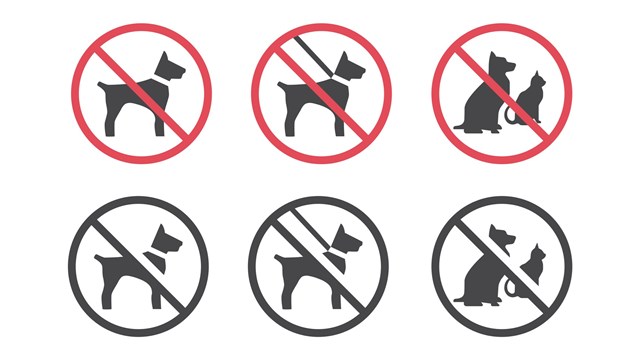Ever wonder how that frisky pug got the penthouse window seat in a "pet-free" building? Or how that tabby from 4C manages to saunter down the hall like he owns the place? Thanks to New York City's "pet law," many co-op and condo owners have found a way to keep a pet or two despite their building's otherwise anti-pet policy.
Established in 1983, the law was originally created in response to disputes arising between landlords and rental tenants. In these cases, landlords who had looked the other way for years when it came to their tenants' cats and dogs were suddenly evicting these same people for breaking no-pets rules. As one might expect, these evictions were happening as the housing market grew tight and apartments became more valuable. In short, the evictions were likely taking place simply to free up space that could be rented for more money. In an effort to stem these types of evictions, the New York City pet law was passed.
With those circumstances in mind, it's easy to see how the law developed into its present form. In basic terms, the New York City pet law states that residents living in buildings with more than three units may keep a pet in a no-pet building if that animal has been kept "openly and notoriously" for three months or more.
Unfortunately, "open and notorious" is not nearly as scintillating as it sounds. It simply means that if you live in a building and own a dog, the porter need only see your dog once and fail to report it for the law to kick into effect. Even if a board member sees it four months later, it won't count because another building employee - the porter - already knows of its existence. "It doesn't have to be so open and notorious," says attorney Doug Heller of the Manhattan law firm of Friedman Krauss & Zlotolow. "Someone just has to see it."
Manhattan-based attorney Karen Copeland says some interpretations are even looser, especially in the case of animals that don't usually leave the premises, such as cats or small, litter-trained dogs. With a cat, it's difficult to argue that someone must have seen it because it gets walked through the lobby every day. It's a very rare cat that ever leaves its home. This is when some of the more lax interpretations of the law come into play. Simply leaving the food bowls and cat toys out when the superintendent comes to visit the apartment may be enough to meet the "open and notorious" requirement. "Some residents will take snapshots of their cats in the window to prove they're visible from the street," Copeland says.
In addition to being "open and notorious," the owner will need to prove that the dog or cat has been theirs for at least 90 days. This is rarely a problem. "You don't pick up too many mutts in New York City," Heller says. "Chances are it will have papers."
In theory, the law protects multiple animals as well - if they have all been purchased and kept openly at the same time. In each instance when a new animal is purchased, however, it must go through the whole process of being seen and accepted all over again. The same procedure applies if the pet dies and the owner decides to get a new one.
When a formerly pet-friendly building introduces a new no-pet policy, the common practice is to allow pre-existing pets to be grandfathered in and kept without problem. "Of course, then if that pet dies, people go around trying to find a dog or cat that looks exactly like the one they had before," Heller says.
Of course, lots of people are more than willing to simply forgo having Fido or Fifi around and live by the rules laid down by their board, but for those whose pets are simply smaller, fuzzier family members, there are ways to keep the pet in the picture.
Like all legalities, however, the pet law is not as simple as it sounds. For one thing, it varies from borough to borough, applying to some forms of housing in one area and not in others. While the law applies to co-ops throughout New York City, it does not apply to condos in Manhattan or the Bronx. The main difference? The pet law was initially conceived with rental properties in mind. Therefore, it is more easily applied to co-ops with their proprietary leases than to condominiums. "The landlord-tenant relationship was deemed similar enough to the board-resident relationship for the pet law to apply," Copeland says. For a pet owner subletting a condo, the pet law would apply - again, because of the tenant-landlord relationship.
Another variation on the law stems from the question of when a board must take action against residents breaking a no-pet policy. In some areas of the city, merely sending a letter to the offending resident constitutes taking action. If the board does this within 90 days of the pet's arrival, then they have taken the necessary action required by law to dismiss the pet from the building. In other areas of the city, however, a letter will not count for much of anything. A board that sends a letter or notifies the resident verbally will not have a legal leg to stand on - serving the resident with official, notarized legal papers is the only way to make a stand within the 90 days.
Another vagary comes in the form of who is "qualified" to spot and report the pet. Some rulings have interpreted the law to mean that the owner or owners of the building must see and ignore the pet for the "open and notorious" aspect of the law to take effect while others have said that a simple glance from the doorman may fit the bill.
There are few if any occasions when a service animal is not allowed in a co-op or condo, no matter what the building's policy on pets. "These animals are definitely protected by law," Copeland says. "But in some cases, you have to prove that the animal is providing a service."
When it comes to seeing-eye or hearing dogs, the service they provide is obvious. When it comes to animals that support individuals with less visible disabilities, the purpose might be less apparent. "A lot of people think of disability laws as only covering things like blindness," Copeland says. "But it can also apply to things like chronic depression, attention deficit disorder, or learning disabilities. People affected by these things may be able to keep an emotional support animal because it can be a best friend, a conduit to communication, all the things that dogs are. Especially with children, the effect of a dog can be really dramatic."
Sometimes these "invisible" disabilities can be difficult to prove. "There has to be a doctor who will say that this dog will help you when Prozac won't," Heller says. "If you really have the dog by virtue of a disability - say you're depressed - you're going to win the case. The only way you're going to lose is if the dog is not actually serving that purpose."
For prospective pet owners who see the disability act as a way to get around a no-pet rule, the ruse may prove dangerous. "Chances are, if you're a total phony, you'll get caught," Heller says.
There are occasions when the pet law will not protect an animal, regardless of how openly and notoriously it has been kept. The law does not protect farm animals or exotics - so the billy goat in the den or the Komodo Dragon hidden in the guest bathroom won't have much of a defense if caught by the superintendent. And regardless of pet law policies, ferrets are completely outlawed in the city of New York.
The law does not protect dangerous animals or "nuisance" animals, meaning those animals that disrupt the lifestyle or peace and quiet of the other building residents. The disruption has to be severe, though, to truly be a problem. "The animal has to be a substantial detriment to the residents," Copeland says. "Basically, the animal has to do something really bad and it has to do it a lot."
Sometimes, though, a no-pet policy really means a no-pet policy and a building will take action to evict the animal, no matter how peaceful it is. Often, residents who want to keep their pets have far more recourse than they believe. "In some cases, people recognize what the law does," Copeland says. "But some landlords are still trying to push it and some people may not assert their rights. They could have won their cases, but didn't push it."
If a resident is in violation of a no-pet policy, the board can begin eviction proceedings, although boards are usually reluctant to embrace that approach. "They don't really want to evict people," Heller says. "They just want to get rid of the dog. But a lot of people will leave if they lose their case because they like their dog better than their building."
Riverfront view or soulful puppy eyes? Sometimes the choice between four walls or four-legged friends can be a difficult one. Thanks to the New York City pet law, however, animal owners and boards have guidelines in place to help them find a peaceful balance between pet-free and pet-friendly.










4 Comments
Leave a Comment